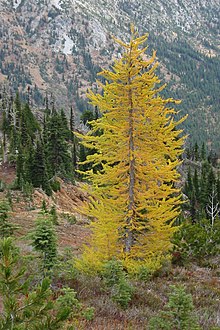Larix lyallii
| Larix lyallii | |
|---|---|

| |
| Scientific classification | |
| Kingdom: | Plantae |
| Clade: | Tracheophytes |
| Division: | Pinophyta |
| Class: | Pinopsida |
| Order: | Pinales |
| Family: | Pinaceae |
| Genus: | Larix |
| Species: | L. lyallii
|
| Binomial name | |
| Larix lyallii | |

| |
| Natural range of Larix lyallii | |
Larix lyallii, the subalpine larch, or simply alpine larch, is a deciduous, coniferous tree native to northwestern North America. It lives at high altitudes—1,800 to 2,400 m (5,900 to 7,900 ft)—in the Rocky Mountains of Idaho, Montana, British Columbia, and Alberta. There is a disjunct population in the Cascade Range of Washington.
Subalpine larch is hardy and can survive at low temperatures and on thin rocky soils; the tree is often found near treeline. However, it can grow in a variety of soils and with or without shade, as long as the soil is moist but well-drained.
Description[]

Larix lyallii is a small tree, growing from 10 to 25 m (33 to 82 ft) tall and shorter at higher elevations. It has a straight trunk with a sparse and somewhat conical crown. The branches are horizontal, perpendicular to the trunk, irregularly spaced and twisted. The twigs are finely hairy. The needles are four-angled, 20 to 35 mm (0.79 to 1.38 in) long and crowded in groups of 30 to 40 on short spurs. They are pale blue-green and deciduous, turning golden yellow in autumn.
The seed cones, 2.5 to 4 cm (0.98 to 1.57 in) long, are red-purple when young but become dark brown with age. They have thin scales and narrow bracts that extend over the scales. The bark is thin and turns from yellow-gray to dark red-brown with age. It also becomes deeply furrowed into small, scaly plates.
The tree is also one of the longest lived tree species. There is record of a specimen in Kananaskis, Alberta which has been estimated (extrapolated) to be ~2000 years old, the oldest tree in Canada.[2][3]
Uses[]
The bark contains tannin and the wood is strong, heavy, and durable.
References[]
- ^ Farjon, A. (2013). "Larix lyallii". IUCN Red List of Threatened Species. 2013: e.T42314A2971798. doi:10.2305/IUCN.UK.2013-1.RLTS.T42314A2971798.en.
- ^ "OLDLIST". Rocky Mountain Tree Ring Research. Retrieved 20 July 2012.
- ^ Worrall, John (1990). "Subalpine Larch: Oldest Trees in Canada?". The Forestry Chronicle. 66 (5): 478–479. doi:10.5558/tfc66478-5.
External links[]
| Wikimedia Commons has media related to: Larix lyallii (category) |
- IUCN Red List least concern species
- Larix
- Least concern flora of the United States
- Trees of Alberta
- Trees of British Columbia
- Trees of the Northwestern United States
- Flora of the Rocky Mountains
- Deciduous conifers
- Trees of North America
- Trees of the United States
- Trees of Canada
- Trees of Western Canada
